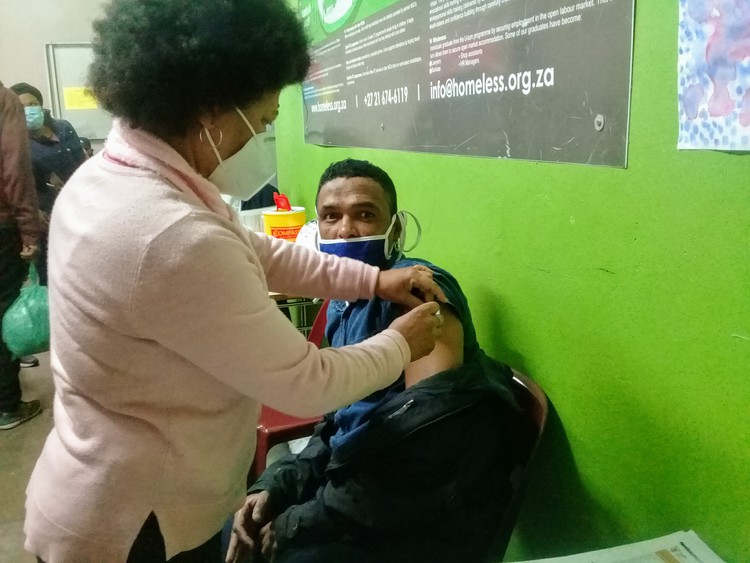Undocumented people can now get Covid vaccines - in some areas
Provincial pilot programmes are underway but details are vague
Staff nurse Dinah Boltman gives the Johnson and Johnson vaccine to Ashley Charles at the U-turn Homeless Service Centre in Claremont last month. Archive photo: Marecia Damons
- Until recently people without ID documents or refugee documentation could not be registered for vaccination on the government’s system.
- But the system has been updated and pilot programmes are underway in Cape Town, Durban and Tshwane, though details are scanty.
- Over 500 homeless people have already been vaccinated in Cape Town.
Pilot programmes to vaccinate undocumented people are underway, but the details of these drives are vague.
In July, GroundUp reported that people without identity documents were being left out of the country’s vaccination drive, as the Electronic Vaccination Data System (EVDS) was only able to register people with South African identity documents or refugee documentation.
Then in August, we reported that the National Department of Health (NDoH) had appeared to commit to an October deadline for amending the EVDS process to accommodate people without documentation. The national and Western Cape health departments both confirmed that the EVDS system can now accommodate undocumented people and that there have been successful pilot vaccination programmes targeted at undocumented people.
Some homeless people or many immigrants who are not in the country lawfully do not have a South African identity document or asylum papers. Nevertheless, to reduce the spread of Covid it is important that undocumented people get vaccinated.
In early August, the first vaccination drive in Cape Town specifically designed to accommodate people who may not have documentation took place at The Hope Exchange, a NGO that provides key services to vulnerable and street-based people.
Peter Solomon, director of The Hope Exchange, said that the drive had been very positive, well-done and well-received.
Solomon explained that the vaccination drive came about after the centre did a drive to register their clients for the up-coming elections. This drive involved registering some people who were without IDs, whether lost, stolen, or confiscated. After hearing of the success of this drive, the Western Cape MEC of Health Nomafrench Mbombo contacted The Hope Exchange and asked if they would do a vaccination drive.
“We went on a brief awareness drive. We get about 100 to 120 clients each weekday who use various feeding opportunities. At those times, we started with posters and awareness,” said Solomon. “There was a reasonably strong response. Some who were hesitant changed their minds.”
The Hope Exchange was the first place in the local homeless sector to host a vaccine drive, and subsequent drives have been rolled out at other homeless service centres across Cape Town.
Solomon said that there is a fairly strong contingent of anti-vaxxers among the homeless that visit The Hope Exchange. These people were telling others not to come and spreading conspiracy theories. While some people were put off, many weren’t, said Solomon, which contributed to a very successful day.
On the day of the drive, the provincial health department brought its mobile vaccination team that had been going to old age homes. “We fitted in with their schedule and dates,” said Solomon. While the event at The Hope Exchange has not been repeated there, Solomon said that if the department gave them the opportunity, they would take it.
Of about 200 vaccines available for that day, 130 were administered.
Mark Van Der Heever, a spokesperson for the provincial department, said 501 street-based people in the metro have been vaccinated so far. He said that the EVDS system has been updated so that all provinces can now vaccinate and capture undocumented people.
“In the Western Cape our teams have dedicated outreaches in specific areas where street-based and undocumented people live. These are scheduled locally by the teams,” he said. “Any person without identification is recorded as ‘undocumented’ manually on the registration form and then vaccinated. This data is then back-captured on the electronic system.”
He advised that people without documentation who wished to be vaccinated should reach out to their local health office.
Foster Mohale, spokesperson for the national department, said that the vaccination of undocumented and homeless citizens has been piloted and coordinated from the provincial level in Cape Town, Durban, and Tshwane. “This is part of our commitment that no one will be left out of the vaccination programme. Other provinces will soon follow once all logistics have been finalised because this involves consultation and collaboration with several stakeholders.”
Mohale described these efforts as pilot projects but could not say how many undocumented people had been vaccinated across the country so far.
He said that identifying key communities with many undocumented people is an “ongoing process”, but added that it “is easier to coordinate vaccination services for those who are in shelters and closed camps”.
Support independent journalism
Donate using Payfast

Don't miss out on the latest news
We respect your privacy, and promise we won't spam you.
Next: Shockingly bad service at Home Affairs as queues begin at 2am
Previous: Elections 2021: This municipality is an exception in Gauteng
© 2021 GroundUp. This article is licensed under a Creative Commons Attribution-NoDerivatives 4.0 International License.
You may republish this article, so long as you credit the authors and GroundUp, and do not change the text. Please include a link back to the original article.
We put an invisible pixel in the article so that we can count traffic to republishers. All analytics tools are solely on our servers. We do not give our logs to any third party. Logs are deleted after two weeks. We do not use any IP address identifying information except to count regional traffic. We are solely interested in counting hits, not tracking users. If you republish, please do not delete the invisible pixel.

